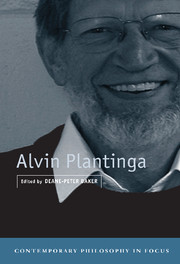Book contents
- Frontmatter
- Contents
- Contributors
- Acknowledgements
- Introduction: Alvin Plantinga, God's Philosopher
- 1 Natural Theology
- 2 Evil and Alvin Plantinga
- 3 The Modal Metaphysics of Alvin Plantinga
- 4 Natural Theology and Naturalist Atheology: Plantinga's Evolutionary Argument Against Naturalism
- 5 Two Approaches to Epistemic Defeat
- 6 Plantinga's Model of Warranted Christian Belief
- 7 Pluralism and Proper Function
- 8 Plantinga's Replacement Argument
- Appendix: Two Dozen (or so) Theistic Arguments
- Select Bibliography
- Index
8 - Plantinga's Replacement Argument
Published online by Cambridge University Press: 27 October 2009
- Frontmatter
- Contents
- Contributors
- Acknowledgements
- Introduction: Alvin Plantinga, God's Philosopher
- 1 Natural Theology
- 2 Evil and Alvin Plantinga
- 3 The Modal Metaphysics of Alvin Plantinga
- 4 Natural Theology and Naturalist Atheology: Plantinga's Evolutionary Argument Against Naturalism
- 5 Two Approaches to Epistemic Defeat
- 6 Plantinga's Model of Warranted Christian Belief
- 7 Pluralism and Proper Function
- 8 Plantinga's Replacement Argument
- Appendix: Two Dozen (or so) Theistic Arguments
- Select Bibliography
- Index
Summary
INTRODUCTION
Alvin Plantinga has recently turned his attention to materialism. More precisely, he has turned his attention to the thesis that philosophers of mind call materialism. This thesis can be variously formulated. In this essay, I will take “materialism” to be the conjunction of the following two theses:
(1) Human persons – what human beings refer to when they use the first-person-singular pronoun – are substances. They are substances in the strict and philosophical sense: They persist through time, retaining their identities while changing various of their accidental properties; they are not grammatical fictions; they are not “modes of substance”; they are not logical constructs on shorter-lived things (they are not entia successiva); they are not abstract objects (they are not, for example, things analogous to computer programs); they are not events or processes.
(2) These substances, these human persons, are wholly material. They are (if current physics is to be believed) composed entirely of up-quarks, down-quarks, and electrons, so related by the electromagnetic and color forces as to compose matter in its solid, liquid, and gaseous phases. They are, in two words, living organisms – or, if not whole living organisms, then parts of living organisms (human brains, brains-plus-central-nervous-systems, brain stems, cerebral hemispheres, cerebral cortices – or perhaps even luz bones or tiny, almost indestructible material things unknown to physiology …). They have no immaterial part.
- Type
- Chapter
- Information
- Alvin Plantinga , pp. 188 - 202Publisher: Cambridge University PressPrint publication year: 2007
- 1
- Cited by

